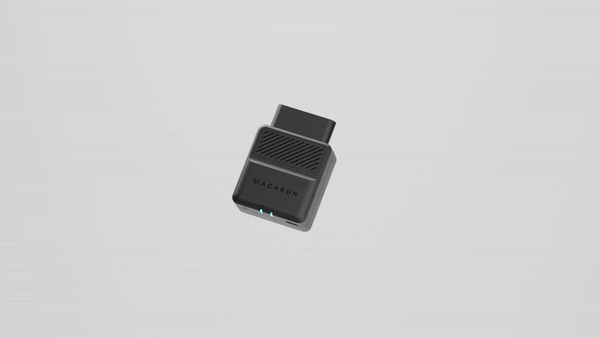Under the Hood of the DIMO Macaron
The appetite for details about the DIMO Macaron is extremely high — we’re continuing to share a ton about the DIMO Macaron as we build towards global availability of the device.
Outlined here are a few key aspects of the device that have generated the most questions.
DIMO Mobile + Helium IoT = Cheapest Telematics Device
Most telematics services — whether you are using the built-in connectivity or an aftermarket device — have a subscription between $5-$15/month to keep vehicles connected and data flowing. The DIMO Macaron avoids this recurring cost by launching on Helium, a LoRaWAN network that sends data wirelessly at a fraction of the cost.
At launch, the DIMO Macaron will use LoRaWAN only, with the Bluetooth offload expected to arrive in early 2024. The device is designed to send data over LoRa approximately every 30 seconds. This action will be passive whenever the car is being driven, and because the device’s power requirements are so small, the device can also send a heartbeat with data when the car is off (more on what data below).
With Bluetooth, the frequency of data will increase to every 1-5s, depending on the vehicle and its CAN bus, so long as the device owner’s phone is in the car. This creates a sort of active (BT) and passive (LoRA) mode and creates redundancy of connection.
The Macaron will have 3 years of connectivity included in the upfront cost of $99 alongside the coming feature of Bluetooth data offload from device to the driver’s phone. Compared to the average telematics device that would run $300-$400 over 3 years, it’s a huge win for drivers and fleets. The devices are not pre-loaded with DC, but these DCs are being provided by Digital Infrastructure Inc. Our modeling estimates that the average driver will require about $0.25 in DC per month (based on estimates like this one for the average miles driven per year).
It’s worth noting that if you have been running a Helium hotspot — whether just one or a whole country’s worth — the implications of the DIMO Macaron add up. Each connected car in your hosted area could contribute $3 in spend over the next 3 years. A small number per vehicle, but at thousands of vehicles, it adds up.
Vehicle Data
The DIMO Macaron is capable of querying approximately 32 signals from the CAN bus per vehicle, and can be used to query for and clear error codes (DTCs). What particular data will be available for your vehicle varies — not all data is available to be read on every car. We’ve explained some of the nuances of reading data from vehicles before and made a bunch of progress on expanding the data each car provides. We’re expecting to see a lot of strides forward on vehicle data.
Practically, that means that the Macaron today can send all the data that the AutoPi can, but with less frequency.
For the DIMO Macaron specifically, there are a few additional layers. First, given the constraints of sending data over LoRa and the possibility that even after BT, the driver does not have the paired phone, the DIMO Macaron is equipped to store approximately 1,500 hours of driving data. This data can be uploaded later, meaning that even if drive data is not uploaded at the moment, a complete record is available.
One novel aspect of the DIMO Macaron is that its power draw is far lower than the AutoPi, which uses a Raspberry Pi. This means that the DIMO Macaron can query and send data while the car is off. It won’t run all the time, but it will check-in and send a few key data points, like GPS location, battery voltage, fuel level, and more every few hours. This delivers peace of mind from your car remotely — you’ll know if a surprise is awaiting you when you get back to your car.
After launch, we’re going to be working to optimize the signals that the Macaron collects and sends to improve the user experience and the data available to developers via the DIMO Platform.
A Professional Grade Device

The DIMO Macaron was built by Hashdog, a subsidiary of JDI, a company with a long history of manufacturing IoT and OBD2 devices.
Together, we’ve been able to engineer a device that maximizes the CAN system interface allowing for in-depth vehicular diagnostics and real-time data collection from your vehicle and uses minimal battery during vehicle inactivity, so you can even get some data off the device when the vehicle is off.
There are also a number of security features built into the device. We’ll share more about Macaron security in the future in more depth, but the secure element integrated with the device prioritizes security and data validation. Minting the device itself on chain ensures device and data integrity, as well as a certificate of DIMO compatibility and complete traceability and validation of the manufacturing history.
The hardware expertise that has gone into the device makes the DIMO Macaron makes the device a reliable option for individuals or fleets.
You can now pre-order the Macaron for delivery in November.
See you on DIMO.
Alex Rawitz has spent his career in and around startups in the crypto and IoT world, and is always looking to put these technologies to work making people’s lives better. Prior to DIMO, Alex worked with exchanges, defi protocols, and fintechs at Chainalysis. Before that he worked in sales at Servato, an IoT company in the telecom space. He started his career at a startup accelerator, The Idea Village, in New Orleans.